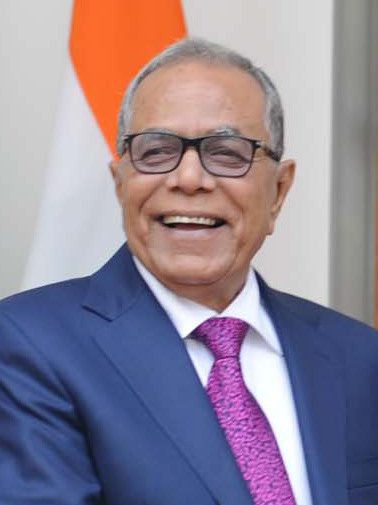Following the sudden and midnight departure of former President Md. Abdul Hamid—an accused in the July uprising murder case—on a Bangkok-bound flight, two critical questions have emerged in Bangladesh: 1. Is the law applied equally to all? and 2. Who should be held responsible for facilitating what appeared to be a public and unrestrained departure?
On Friday, the Office of the Chief Adviser issued a statement acknowledging the public anger over the incident. The statement declared that the government is committed to taking appropriate legal action against those involved in the departure of the former President, who is also an accused in a murder case related to the July uprising.
Times of Bangladesh reported under the headline “Hamid’s midnight exit” that the former President left the country late Thursday night, nearly nine months after the overthrow of the Awami League government. He boarded a Thai Airways flight at 3:05 a.m. from Hazrat Shahjalal International Airport, reportedly using full VIP protocol. He completed immigration formalities from his car, and his travel was conducted with the knowledge of police and intelligence officials.
The public outcry that followed led to swift administrative actions.
Kishoreganj’s SP Muhammad Hasan Chowdhury and Additional Superintendent of Immigration Police Tahsina Arif were removed from their posts. SI Azaharul Islam, the investigating officer in the murder case, and ATSI Mohammad Solaiman from the Special Branch were suspended. A three-member inquiry committee has also been formed.
The case against Hamid was filed on January 14 in Kishoreganj, naming him and several top leaders of the former ruling Awami League, including Sheikh Hasina, as accused in connection with the July uprising killings.
It is important to note that Abdul Hamid’s departure was neither illegal nor secretive. He traveled on a scheduled commercial flight, and there was no travel ban issued by any court or administrative order. Immigration and police authorities later confirmed that Hamid faced no restrictions on foreign travel.
Investigations reveal that after completing his presidential term in 2023, Hamid returned his diplomatic passport and was issued a valid ordinary passport, which was neither cancelled nor seized by the government. No judicial order had restricted his overseas travel, and immigration authorities acted in full compliance with existing law.
Three months ago, Kishoreganj police reportedly sent a letter to the Special Branch requesting steps to prevent Hamid’s departure. However, there is no evidence that the government formally petitioned any court for a travel ban.
Home Affairs Adviser Jahangir Alam Chowdhury said the matter is being investigated.
Law Adviser Dr. Asif Nazrul remarked that it was the duty of the police and intelligence agencies—not the Ministry of Law—to prevent the foreign travel of someone accused in a murder case. He added that judges, under his ministry’s jurisdiction, are not responsible for monitoring airports or controlling individuals’ movements.
While the law adviser clarified the legal boundaries, the disciplinary measures taken against five junior officials have raised questions. Was it just to punish field-level officers when Hamid’s departure was fully known and facilitated at higher levels of the administration?
More broadly, why did the government take no action—arrest, surveillance, or legal proceedings—against a murder-accused former President in the nine months since the case was filed? Was he ever placed under any form of monitoring?
This incident echoes the earlier departure of former police chief Benazir Ahmed during the Awami League’s tenure, who fled abroad amid corruption allegations while evading legal action.
At the time, then Home Minister Asaduzzaman Khan jokingly told reporters that the government would “have to check” whether Benazir was in the country or abroad.
No serious attempt was made to detain him, and he left with his assets mostly untouched.
It now appears that the same permissiveness extended to Abdul Hamid. His travel was facilitated, not obstructed, by the same institutions that later penalised junior officers for dereliction of duty.
When senior officials were aware of Hamid’s scheduled flight, valid passport, and absence of legal restrictions, the blame directed solely at ground-level officers seems less like accountability and more like scapegoating.
If, after his departure, an official committee says it will “investigate how he obtained a passport,” it raises serious concerns about internal coordination and transparency in the state’s administrative machinery.
The Hamid and Benazir cases alike have raised doubts about the government’s sincerity. The subsequent statements and investigations seem more performative than purposeful—reminiscent of Lalon’s verse, “You cut the tree, then water the leaves; Where did you learn such cunning tricks?”
Ultimately, the debate surrounding Abdul Hamid’s foreign travel is not about its legality, but about what it reveals regarding the structure of state responsibility, decision-making, and ethical accountability at the highest levels of government.


